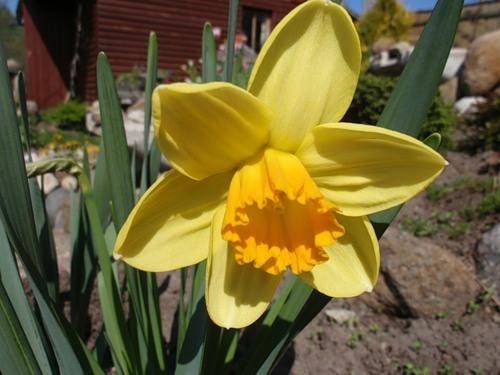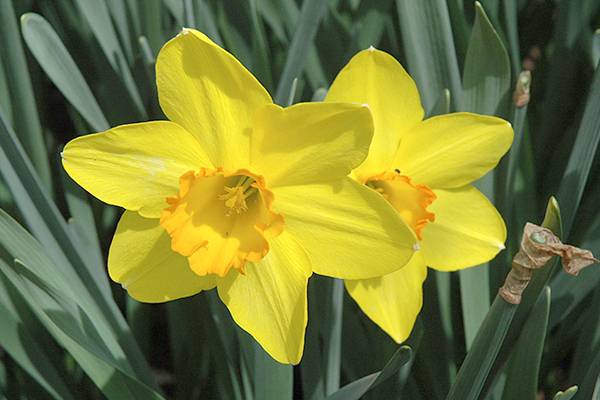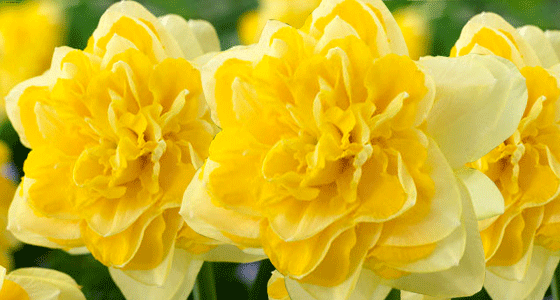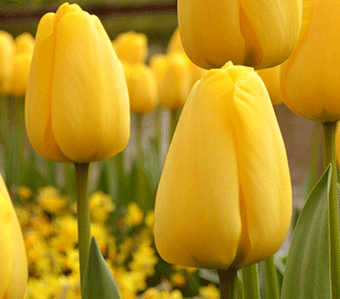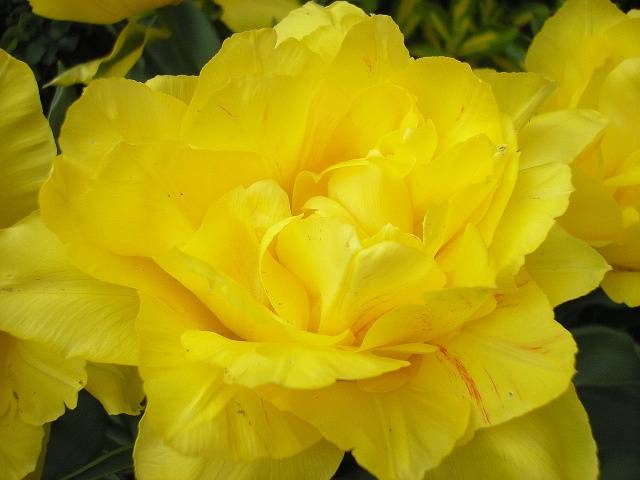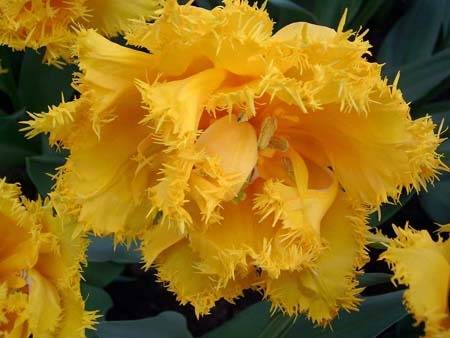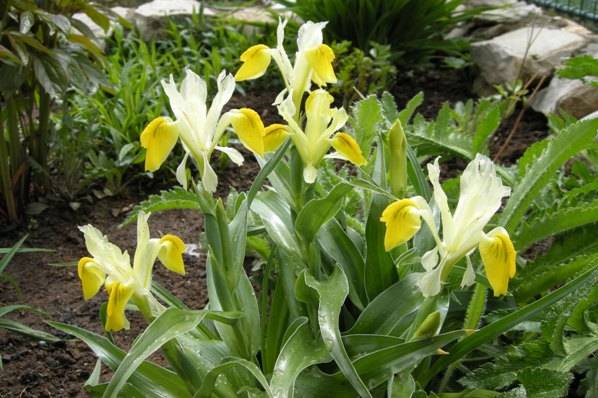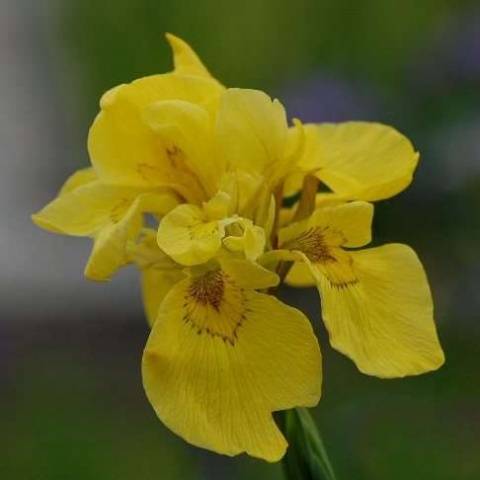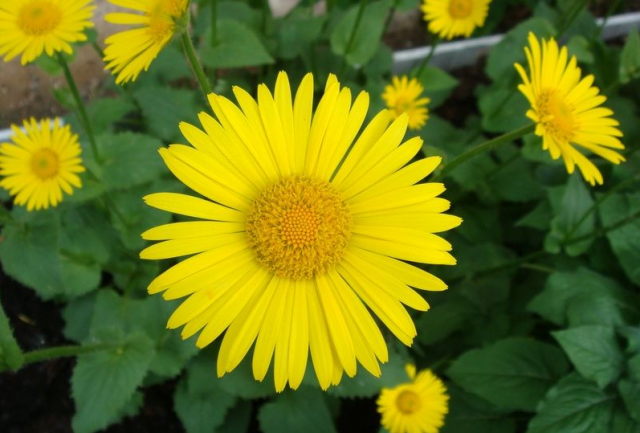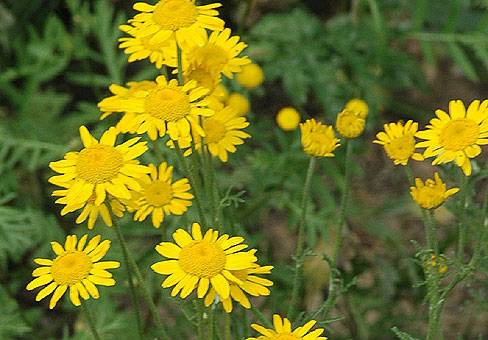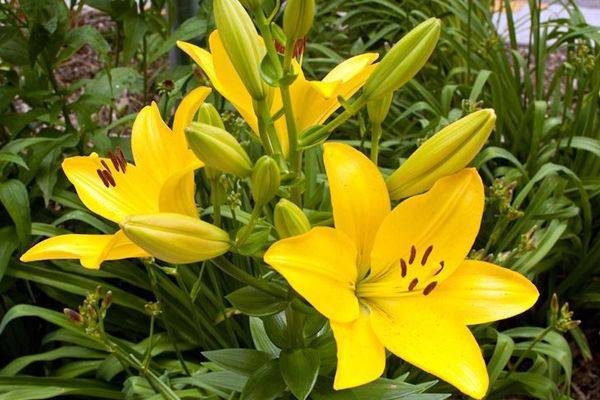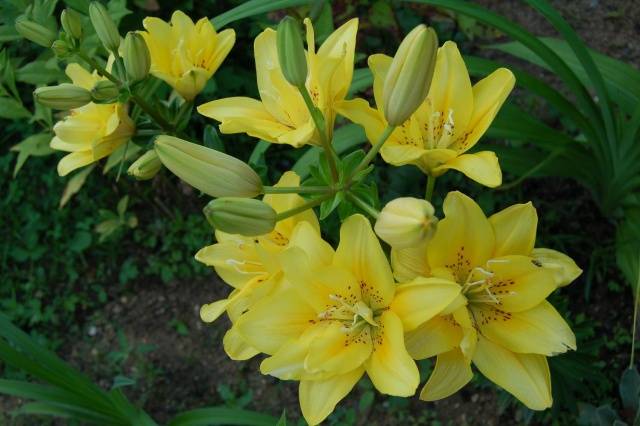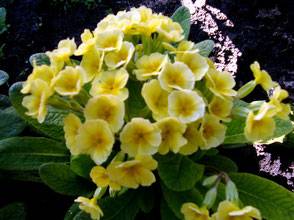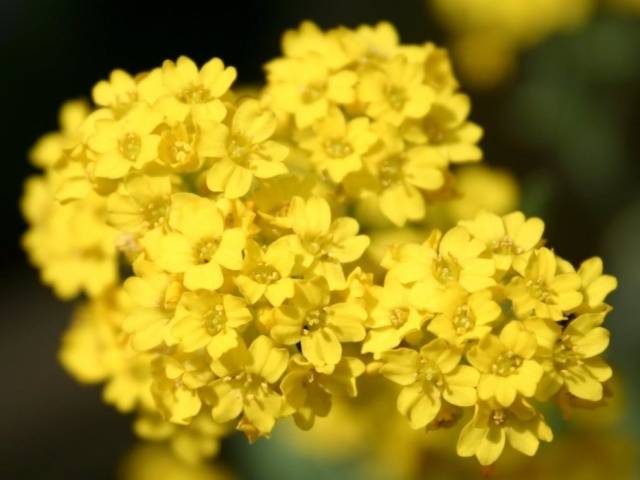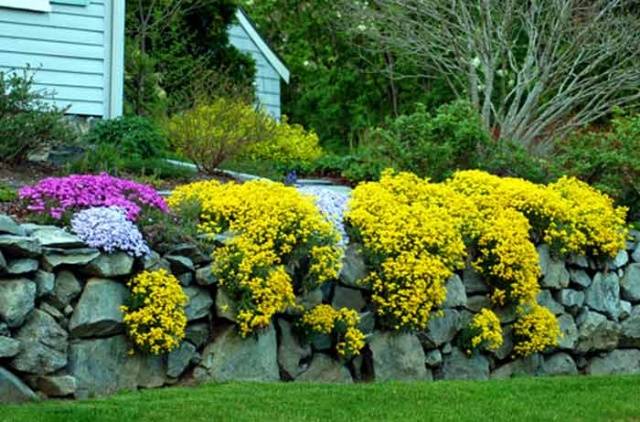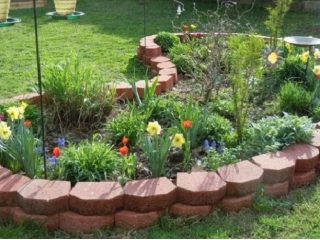It is difficult to imagine a beautiful courtyard of a private or apartment building without flower beds. The owners of the farmsteads always try to decorate their possessions with flowers of various heights, colors, shapes. Especially in demand are sunny, yellow flowers, which, even on the gloomiest day, delight people passing by with their "warmth". At the same time, when choosing a variety of flowers, you can give preference to perennials that do not require annual sowing of seed, thereby saving the time and effort of flower growers. So, the article contains a list of the best perennial yellow flowers, their photo, name and description.
Narcissus
This flower is probably known to everyone who has ever been interested in the issue of growing flowers. The narcissist is very unpretentious. It can be successfully cultivated even in the most scarce soils. It is undemanding to lighting and stable warm weather. Due to such resistance to stressful conditions, the daffodil can be safely advised to novice growers who are not confident in their strengths and capabilities.
It is worth noting, thanks to the efforts of breeders, about 10 different varieties of daffodil were offered to growers to choose from. Most of them have a yellow bud. However, when choosing a variety, you should pay attention to the doubleness of the flowers and the presence of aroma.
Golden Harvist
This variety of daffodil has a strong, sturdy flower stem and a large bud (10 cm). The perianth crown is bright yellow with pronounced waviness of the edges. The height of such a flowering plant reaches 40 cm. The flower of the Golden Harvist variety exudes a pleasant aroma. Its flowering period is 2-3 weeks.
Carlton
It is this kind of daffodil that can be seen most often in flower beds and in front gardens... It is very resistant to bad weather, successfully tolerates a lack of light. Its flower is lemon-yellow in color, up to 10 cm in diameter. The perianth crown is painted in a brighter color, its edges are slightly wavy. This variety of daffodil is especially fragrant. Its flowering period is just over 2 weeks.
Inglescombe
Very beautiful double daffodil, the bud of which consists of more than 40 petals. Its appearance is stunning, however, the peduncle does not have sufficient strength, in rainy weather it may not hold the flower, which will lead to lodging. Plant height is about 40 cm, flower diameter is 8 cm. The dense yellow flowers of this variety exude a light, unobtrusive aroma and are recommended for cutting.
The above garden flowers are yellow perennials that propagate by bulbs. Daffodils should be planted in open ground between October and December to a depth of 10-15 cm. A distance of 5-10 cm should be observed between the bulbs during planting. For the winter, planted daffodil bulbs should be covered to prevent freezing. Having planted plants in the fall, seedlings should be expected next spring. Daffodils bloom in late April - early May.
Tulip
Tulip is a conqueror of women's hearts, originally from Holland. Songs are composed about these yellow perennials, and it would be at least unfair to ignore them. So, below are the best varieties of yellow tulips that can decorate every flower bed.
Golden Apeldoorn
A tulip with this calyx shape is considered traditional.It can be grown, including in temperate climates. The flower of the Golden Apeldoorn variety has amazing decorative qualities: its height reaches 60, and sometimes even 80 cm, the diameter of a rich yellow glass is 6 cm.
The variety of these yellow flowers can be grown in greenhouses and outdoors. The plant is great for cutting and arranging bouquets.
Monte Carlo
The Monte Carlo variety is represented by double tulips, which can be seen above in the photo. The wonderful flowers are lemon yellow and exude a sweet, pleasant scent. The height of each tulip reaches 50 cm, the diameter of the opened bud is 10-12 cm. This wonderful flower is the embodiment of lightness and grace. Planting tulips of this variety, 40-45 bulbs per 1 m2 land, you can get a charming flower bed, like a yellow cloud.
Mon amyr
An amazing, fringed yellow tulip of the "Mon Amour" variety can decorate any flower bed or become a "highlight" of a bouquet. The height of the plant's leg is 55-60 cm, the height of the glass is 7-9 cm, its diameter is about 10 cm. Large buds are decorated with delicate fringes. Soft, thin needles frame delicate petals. A bouquet of tulips of this variety will surely enchant every lady with its beauty and delicate sweet aroma.
In addition to the listed varieties, yellow tulips are "Texas Gold", "Yellow Crow", "Laverok", "Hamilton". All of these yellow perennials are planted with bulbs in the fall. The best time for planting tulips in a temperate climate is at the end of September - beginning of October, when the soil at a depth of 10 cm has a temperature of no higher than +100C. Tulip bulbs should be immersed in the soil to a depth of 15-20 cm. For the winter, it is recommended to protect crops with insulating materials, for example, mulch or geotextiles.
The tulips bloom in the spring month of May. However, it is worth remembering that beautiful, full-grown flowers can only be obtained when grown in nutritious, loose soil. It is necessary to transplant tulips to a new place once every 5 years. The video gives recommendations on how to properly plant (transplant) tulips in the fall:
Iris
Irises are a wide variety of varieties, including dwarf and tall flowers with yellow buds. When choosing a particular variety of irises, you should pay attention not only to the color and size of the flowers, but also to the type of root system, since it can be bulbous or rhizomatous, which affects the reproduction and transplantation of plants.
Juno (Bukharian)
Iris of this bizarre variety has a bulbous root system. The leaves of the "Juno" iris are lanceolate, up to 20 cm long. Their width is about 4 cm. Peduncles grow from a lush green bush - stems up to 40 cm high. At the top of the peduncles you can see flowers that combine elements of yellow and white color. The average height of the flower calyx is 5 cm. Up to 7 flowers are formed on each peduncle.
Growing such a yellow perennial in your garden is not at all difficult. It requires moderate watering and full lighting. The Juno variety is unpretentious to the composition of the soil.
Flor captivity
This yellow perennial belongs to the marsh category. It can often be found on the shores of the reservoir, because there is enough moisture for them to grow. This iris is rhizome, has a powerful root system. The height of the plant reaches 90 cm. On each stem of the plant, up to 15 flowers can form, the petals of which are painted in bright yellow. Iris leaves are xiphoid, rather large. Their width can be up to 7 cm.
The perennial yellow iris of the Flor Plena variety is a real decoration of a front garden or a separate flower bed. Its bright and delicate flowers will surely leave no one indifferent.
Planting irises should be taken care of in the fall. In temperate climates, October is the best time to plant outdoors. It is recommended to cover crops for the winter. In early spring, as soon as the snow melts, the irises will begin to sprout. At this time, they should be loosened and, if necessary, fertilized. After the end of spring flowering, the iris bushes should be cut at the root. It is necessary to transplant (plant) these yellow perennials once every 3-4 years.
Chamomile
Chamomile is a traditional garden plant. But few people know that there are 36 different types of these flowers, including varieties of yellow chamomile. Such perennials are capable of creating a sunny mood in the gloomiest weather. You can get acquainted with the varieties of yellow daisies below.
Doronicum (goat)
There are several varieties of "Daronicum" (Caucasian, podorozhny, oriental and others), however, they all have similar characteristics and bright yellow flowers.
These garden flowers can be a real garden decoration. Their height reaches 70 cm, and the diameter of large yellow flowers is up to 10 cm. The petals of "Kozulnik" are reed like those of traditional daisies. Its core is filled with small tubular petals. It is worth noting that such yellow daisies bloom for a long time: along the sea, the flower withers on the main peduncle, and smaller flowers form and bloom on the side shoots. Thus, the Doronicum bush remains charming from May to July.
Anthemis
Anthemis is a slightly smaller yellow chamomile. This variety is also called "Pupavka dyeing". The yellow perennial is unpretentious to the composition of the soil, it can grow in the sun or in the shade. The height of a branchy flower bush ranges from 30 to 50 cm. On its main stems and shoots, yellow daisies are massively formed, the diameter of which is no more than 5 cm. The Antimes variety blooms for a long time, starting from June to August.
Perennial chamomile does not require much maintenance. Sow them in the spring with seeds in open ground. The first summer after sowing, you should not wait for flowering - beautiful yellow flowers will appear only next year. Chamomile tolerates drought and heat well. After the end of flowering, the plants should be cut off. Shelter for the winter is not required. It is necessary to replant perennial bushes every 5 years.
Lilies
There are a huge number of varieties of yellow lily... These include "Yellow Bird", "Solar", "Destiny", "Soulstarite", "Golden Bottom", "Nova Sento", "Wellow" and some others. A description of the most beautiful yellow lilies and their photos are given below.
Nashville
The flower was bred in the Netherlands. A wonderful bulbous plant that delights with its beauty. Each yellow lily of the "Nashville" variety has a flower with a diameter of 15-20 cm. The plant itself is also quite tall: from 60 to 80 cm, perfect for cutting and making bouquets.
Sandew
This wonderful yellow lily will perfectly fit into any floral arrangement. Its flowers are much more magnificent than other varieties of this culture. They have 9-10 large, bright yellow petals, the centers of which are decorated with orange-red dots, like splashes of wine. Their scent is magnificent and beckons every person passing by.
The "Sandyu" lily has a thick, stable peduncle, the height of which can reach 1.5 meters. The flower itself is very beautiful, large. Its diameter can exceed 20 cm. On each peduncle, from 3 to 10 inflorescences are formed. Lilies are great for gardening and cutting.
Lilies are quite whimsical. They are especially demanding on sunlight.For their cultivation, you should choose well-lit places with drained, nutritious soil. The flower bulbs should be immersed deep enough in the soil (the depth is calculated by multiplying the bulb diameter by 3). The listed varieties of lilies are frost-resistant, they do not need to be dug out for the winter. In late autumn, the stems of flowers should be cut off and the planting should be covered with mulch.
Stunted perennials
All the plants described above are quite tall, however, among the yellow perennials, one can distinguish undersized varieties that can decorate not only a flower bed, but also a green lawn familiar to everyone.
Primrose "Yellow Giant"
A yellow perennial, which is only 20 cm tall. The plant grows very well and multiplies quickly, excellent for growing in shaded areas. The flower is resistant to stressful conditions. It can be transplanted even during the flowering process.
It is possible to grow a perennial of the "Yellow Giant" variety in a seedling way: seeds for seedlings are sown in February-March. Seed germination occurs quite late - after 25-28 days. When two or three leaves appear, flower seedlings dive into the ground. A distance of at least 10 cm should be maintained between the flower rosettes.
Starting from the second season, the primrose "Yellow Giant" blooms from April to July. Her wonderful yellow flowers can be seen in the photo above.
Rock alyssum
Groundcover, herbaceous, perennial plant. Its height is within 15-25 cm. The stems of "Alyssum" are highly branched, lying. They are almost invisible under the lush inflorescences, each of which consists of many small flowers of bright yellow color. Fragrant flowers delight with their beauty in April-May. The plant propagates by seeds, prone to self-propagation.
Conclusion
Yellow, undersized perennials are unpretentious, propagated by seeds and do not require preparation for the winter season. They grow strongly, and the abundance of their growth can be regulated by thinning and removing unwanted shoots.
The article contains far from all the names and photos of yellow flowers of perennials. So, it is worth paying attention to the tall eremurus, daylily, rudbeckia, gladioli familiar and familiar to many, chrysanthemums and dahlias.
All these flowers are beautiful, they can be planted in flower beds as the main and only crop, or combined with flowers of other types, varieties, colors. However, it is worth remembering that it is perennial varieties that are less whimsical to growing conditions, they require less time and attention than annual counterparts. The variety of perennial yellow flowers will satisfy the needs of every esthete.
